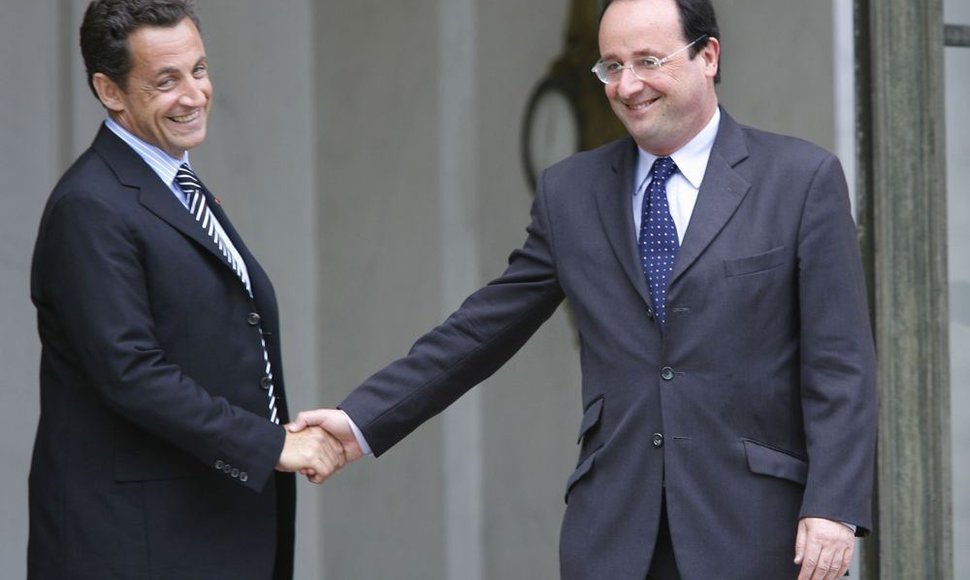According to him, investors and analysts have questions about Hollande's plans of translating his ideas into reality. During the election campaign, the leader of the Socialist Party pledged to revise the fiscal pact that was signed by EU leaders in March to encourage saving policy in a way that it would shift its focus to economic development.
"There can be serious doubts as to how he will persuade Germany's leader (Angela Merkel) and other EU partners into revising the so-called fiscal stability pact that has already been signed," Vilpišauskas told BNS on Monday.
In his opinion, EU leaders may symbolically show attention to development matters.
"I think attempts will be made to demonstrate at least symbolic attention to growth. However, the biggest question is about how it will be done. As we know, the EU already has a strategy Europa 2020, which is, as a matter of fact, intended to provide conditions for economic recovery. The question is what else can be done for this, as very few specific detail were provided during the election campaign," the political reviewer added.
He said the defeat of incumbent President Nicolas Sarkozy, representative of the right wing, was due to public discontent with the economic situation and the president's hyperactive personality.
"Many voters in France voted against the ex-president's personality and the economic situation in France," Vilpišauskas noted.
"The main question is how the disappointed voters accept the new president's policy. Voting against means a rather cautious attitude towards the former president's opponent who won the election," the expert said.
In Vilpišauskas' words, preoccupation with the economic situation may lead to less attention from the French administration to foreign policy, which he said would largely depend on the president-elect's team.
He added Hollande would have to learn aspects of high policy while already in office, while freedom of his maneuvers would be restricted by his earlier commitments.
"A lot will depend on the new president's team – its character and presence of experienced foreign policy figures, as the new president will clearly have to learn while working. He has been on the political arena for a long time, but he has little experience in high policy," Vilpišauskas noted.
"Earlier commitments in foreign policy and European policy will also influence the new president's decisions. The question is whether he will have enough determination and argumentation to bring any radical changes. A number of his pre-election statements could have been so general in order to leave him room for maneuvers in case of victory," the political reviewer said.
Hollande, 57, won the Sunday's elections after collecting 51.7 percent of the vote. He will become the first Socialist president after François Mitterand who left the post in 1995.
Worries over continuity
Lithuanian Prime Minister Andrius Kubilius hopes the European fiscal sustainability policy will not change after socialist François Hollande was elected as France's president.
"I would not want the election results to let someone in Europe or the world believe that the general tendency in Europe is changing, and saving and debt management will no longer be Europe's priority. I believe the so-called fiscal sustainability treaty is a very important treaty for the entire Europe, and, therefore, I would definitely not want to see election results in one country to raise doubts over further implementation of this treaty," Kubilius told journalists on Monday.
The prime minister also expressed regret over incumbent French President Nicolas Sarkozy's defeat in the election.
"Being a counterpart of President Sarkozy in the European party terms, I have faith in the French voters' wisdom and reasons for their choice," Kubilius said.
Speaker of the Lithuanian Seimas Irena Degutienė has said all European Union member states are concerned about possible changes to the austerity policy in France.
"This issue is raising concerns in all EU countries over whether the policy will not change, as we all know that President Nicolas Sarkozy and German Chancellor Angela Merkel have had huge influence on the fiscal discipline pact in Europe. And then comes a president who declares a policy of spending and not saving during his elections campaign - it's not really clear and a little worrying for the entire EU," Degutienė told journalists on Monday.
Europe still forced to save
As the economic crisis continues, Europe will still be forced to save, Lithuanian President Dalia Grybauskaitė said on Monday, commenting on possible changes in the European Union's policy following the election of François Hollande as the new president of France.
"Objective conditions for saving and a stringent financial policy have not disappeared, therefore, I don’t believe something should change. On the contrary, as the crisis continues and we still see consequences of it in southern Europe, I would say a strict saving policy will remain," the Lithuanian president told journalists in Vilnius.
Grybauskaitė believes there might be "additional mechanisms created to stimulate jobs and economic recovery."
Asked whether there were grounds to change the EU financial stability pact, signed in March, the president said: "This is what I wanted to say - that it was signed by 25 countries."
During his election campaign, Hollande promised to seek a review to the pact for it to put more focus on growth.












